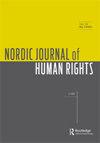强制性人权尽职调查法:模糊了国家保护义务和企业尊重责任之间的界限?
IF 1.2
Q3 POLITICAL SCIENCE
引用次数: 0
摘要
摘要本文从国际人权法公私分割的角度对企业强制性人权法进行了评估。它询问这些法律是否以及在多大程度上通过减少甚至消除公共实体和私营实体之间的义务界限来促进公私界限的模糊。本文还从国际人权法的角度评估了维持这种分界是否合乎规范。它首先通过回顾其理论基础来解释国际人权法中的公私分歧,反思在国际人权法中为公司制定具有约束力的义务的尝试,并在此框架内评估《联合国工商业与人权指导原则》。其次,它分析旨在确立公司人权义务的现行和拟议的国内法和法律文书。它凸显了直接约束公司遵守人权的做法与要求对人权进行尽职调查的法律之间的区别。基于此,本文的结论是,尽管公共和私人之间的界限在实践中日益模糊,但公共和私人之间的界限仍然是国际人权法的一个有用的分析框架。本文章由计算机程序翻译,如有差异,请以英文原文为准。
Mandatory Human Rights Due Diligence Laws: Blurring the Lines between State Duty to Protect and Corporate Responsibility to Respect?
ABSTRACT This paper assesses mandatory human rights laws for companies in light of the public–private divide in international human rights law. It asks whether and to what extent these laws contribute to the blurring of the private–public divide by reducing or even eliminating the boundaries between the obligations of public and private entities. The paper also assesses whether maintaining the divide is normatively desirable from the perspective of international human rights law. It first explains the public–private divide in international human rights law by recalling its doctrinal basis, reflecting on attempts to create binding obligations for companies in international human rights law, and assessing the United Nations Guiding Principles on Business and Human Rights within this framework. Next, it analyses existing and proposed domestic laws and legal instruments aimed at establishing human rights obligations for companies. It highlights the difference between approaches directly binding companies to human rights and laws requiring human rights due diligence. Based on this, the paper concludes that the public–private divide remains a useful analytical framework for international human rights law even though the boundaries between public and private are increasingly blurred in practice.
求助全文
通过发布文献求助,成功后即可免费获取论文全文。
去求助
来源期刊

Nordic Journal of Human Rights
POLITICAL SCIENCE-
CiteScore
1.00
自引率
25.00%
发文量
29
期刊介绍:
The Nordic Journal of Human Rights is the Nordic countries’ leading forum for analyses, debate and information about human rights. The Journal’s aim is to provide a cutting-edge forum for international academic critique and analysis in the field of human rights. The Journal takes a broad view of human rights, and wishes to publish high quality and cross-disciplinary analyses and comments on the past, current and future status of human rights for profound collective reflection. It was first issued in 1982 and is published by the Norwegian Centre for Human Rights at the University of Oslo in collaboration with Nordic research centres for human rights.
 求助内容:
求助内容: 应助结果提醒方式:
应助结果提醒方式:


